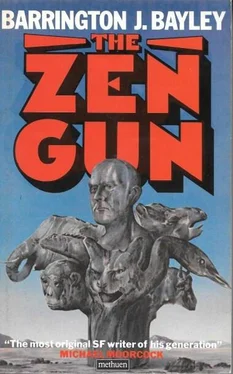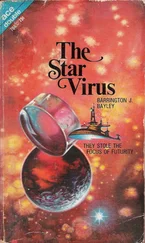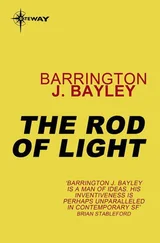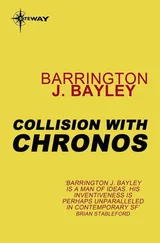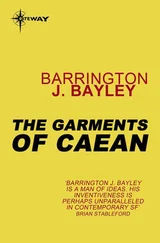“Klemperer, with the backing of the then Emperor of Eurasia, decided to reinstitute the arrangement in modern form, resulting in the cities of the plain of which Mo, named after a scientific philosopher of the Chinese period, is one. To ensure that each city would remain distinct Klemperer placed its government and administration in the hands of a machine mind, so that a city is, in a very real sense, an intelligent entity in its own right. The citizens live in symbiotic relationship with this entity, and are not normally permitted to leave their city. To establish a common cultural heritage with the proper degree of cultural intercourse, the cities were made mobile. From time to time, under the direction of the city minds themselves, they meet up, and then—if you will pardon the term—a kind of cultural copulation takes place. The two cities are connected by bridges and walkways and the two populations mingle with an air of festivity. This is a great occasion in the life of a city.
“The cities of the plain are now three hundred and forty-seven years old. To be honest, the scientific and artistic renaissance Klemperer had anticipated has not yet come about. Nevertheless, Mohists, together with the inhabitants of the other mobile cities, can claim to be the most leisured and continuously educated people in the universe.
“You are welcome to enter. To distinguish you from Mohists proper you will wear an orange badge on your foreheads. Along with all other citizens, you will be required to attend daily lectures in various subjects. For you I have selected a talk entitled ‘Basic Physics.’
“Normally I would add that after three days you may decide whether you wish to become citizens or not. However, astronomical irregularities indicate a strong possibility that our planet may be destroyed in the next few hours. If so, let us endure our fate with philosophical calm and-fortitude!”
At this members of Pout’s party stared at one another. “What irregularities?” Hesper said harshly. There was no answer, other than that the inner grille withdrew, disclosing a path leading, after a few yards, to the interior of the city.
As they stepped onto it, Hesper noted that on the foreheads of her companions circular orange patches had appeared. She put a hand to her own forehead, could feel nothing, but was sure the patch was there.
But there was one exception. The kosho still kept to the rear of the party. Looking back, Hesper noticed that his forehead remained unmarked. She fancied she saw a hint of a smile on his face as he received her attention, as though to convey to her some private joke.
Then they were in Mo. The path gave onto a broad esplanade paved with hexagonal slabs a pale gold in colour. At its fringe people sat at tables under awnings before arcaded doorways, talking and drinking, attended by flimsy-looking robots. At intervals, avenues led to other places.
Hesper lifted her eyes. Up, up and up rose the moulded towers, connected by bridges, interspersed with terraces, suspended plazas and esplanades, all shining in the evening sun. They stood on the ground floor of the city, so to speak, but it had many floors, at dizzying levels.
It was, she had to admit, the most entrancing urban construct she had even seen.
And to think that all this moved.
She pulled on her clothing again, no longer feeling overheated. She reminded herself that she was here for a purpose: to try to join up with whatever remnants of rebel forces their might be, or failing that, to get home.
Pout was staring about himself with a look of idiocy. He seemed to be in shock: culture shock, perhaps.
She patted him on the head. “Well thanks for the company, ape. So long.”
With that, she skipped off lightly to join the Mohists.
Later, she lay back with a sigh on the divan in the delightful accommodation she had been given.
Her conversations with the Mohists had not proved helpful. They seemed disinterested in the outside world beyond the plain. For news of or travel to other planets, she would have to go to some other part of Earth, they had told her. And how did she do that?
She would have to walk. Mo offered no transport facilities, beyond its own enormous treads whose rumblings could, occasionally, be heard in quieter moments.
They had smiled in dazed fashion when she questioned them on the coming end of the world. Earth, they claimed, was about to collide with its own moon. Nothing could prevent it. Mo himself had confirmed the likelihood of it happening.
Recalling what Sinbiane had said, she felt perplexed, almost frightened. Then one of the robots, who seemed to take care of everything, had approached and offered to take her to her apartment. There she had showered, removing the dirt and sweat of the last few days. Now she rested.
The pending satellite collision could not be taken seriously. The universe could be a violent place, but sudden events did not happen without lengthy warning. If this planet’s moon had an orbit so unstable as to decay into its primary, the fact would have been known the Simplex knew how long ago. It would have been the talk of Escoria.
Her own private explanation was that she was being told a cultural fable. The satellite probably had an orbit with variable eccentricity which made it approach closer to the planet at long intervals. That would explain why the boy hadn’t seen it grow visibly bigger before.
As for the Mohists, they were probably crazies, no longer able to separate fable from reality. Centuries of enclosed life, no matter how pleasant the surroundings, under the tutelage of a city-mind that was virtually a god as far as they were concerned, could hardly produce anything else.
A tone suddenly sounded, the same she had heard at the gate. The voice that followed, however, was masculine.
“Visitor, this is Mo speaking. It is time for your evening lecture.”
Hesper started, thrilled despite herself. The voice was that of a young but mature man, vigorous and confident. It brought to mind the sort of visage she had seen on ancient statues, framed in dark curls, handsome, intelligent and strong. The face of a deity…
A thought struck her. Could it be that some of the city minds had female gender?
There could be more ramifications to this society than she had penetrated so far.
Almost coyly, she said. “I’m tired, I’ll skip the lecture, thank you.”
“Education is obligatory,” the godlike voice replied gently. “The whole point of a leisured class is that it may cultivate the mind. Your weariness is in body only. Since you are too tired to walk to the lecture hall, I shall bring it to you by sensurround. Just relax.”
The room darkened. Hesper seemed to be transported to some other place: a semidark hall, quite small in size though she became aware of its slightly echoing acoustics. It had a plush smell, quite different from her perfumed apartment.
In reality she was also aware that she still lay on her bed; sensory beams were being aimed at her. Down the slope of the lecture room, the display area suddenly lit up with the words:
DISCOVERING THE SIMPLEX
The words cleared: there began a sequence of images accompanying a spoken text, which to Hesper’s mild surprise was voiced by Mo himself.
“The foundation of modern physics,” the voice said in cordial, instructing tones, “was established by Vargo Gridban two thousand years ago. He it was who replaced the picture of space and matter then prevailing, involving several types of fundamental particle with several kinds of forces acting between them, with a scheme requiring only one type of elementary particle and one fundamental force.
“Gridban’s work began with the observation that the spacetime in which we live is so constituted that, while it could accommodate forces of repulsion, forces of attraction ought to be impossible in it. Yet attractive forces—gravitation, electromagnetism, nuclear binding force—do appear to exist and are responsible for both the small and large scale structures in our universe, from atoms to galaxies. Instead of simply accepting the existence of these forces, as scientists before him had done, Gridban came to the opposite conclusion and accepted their impossibility. It followed that gravitation, electromagnetic attraction, and nuclear force could only be apparently attractive: they might even depend on a completely opposite type of phenomenon for their effect.
Читать дальше
